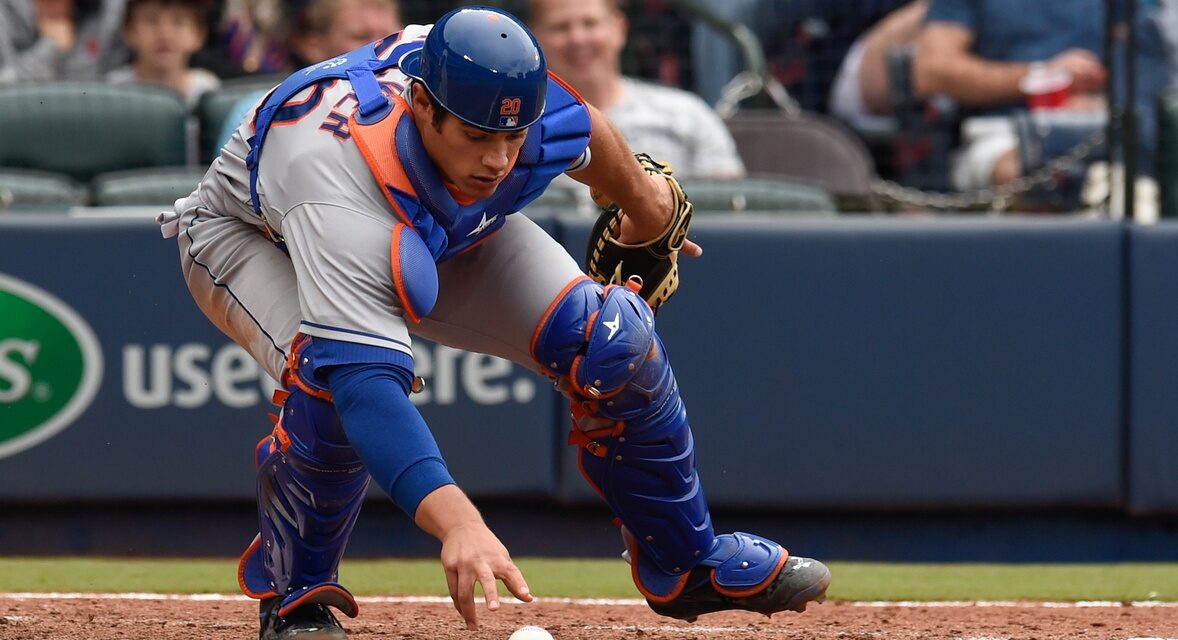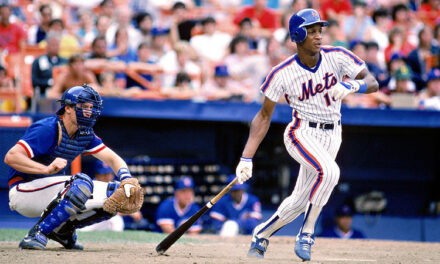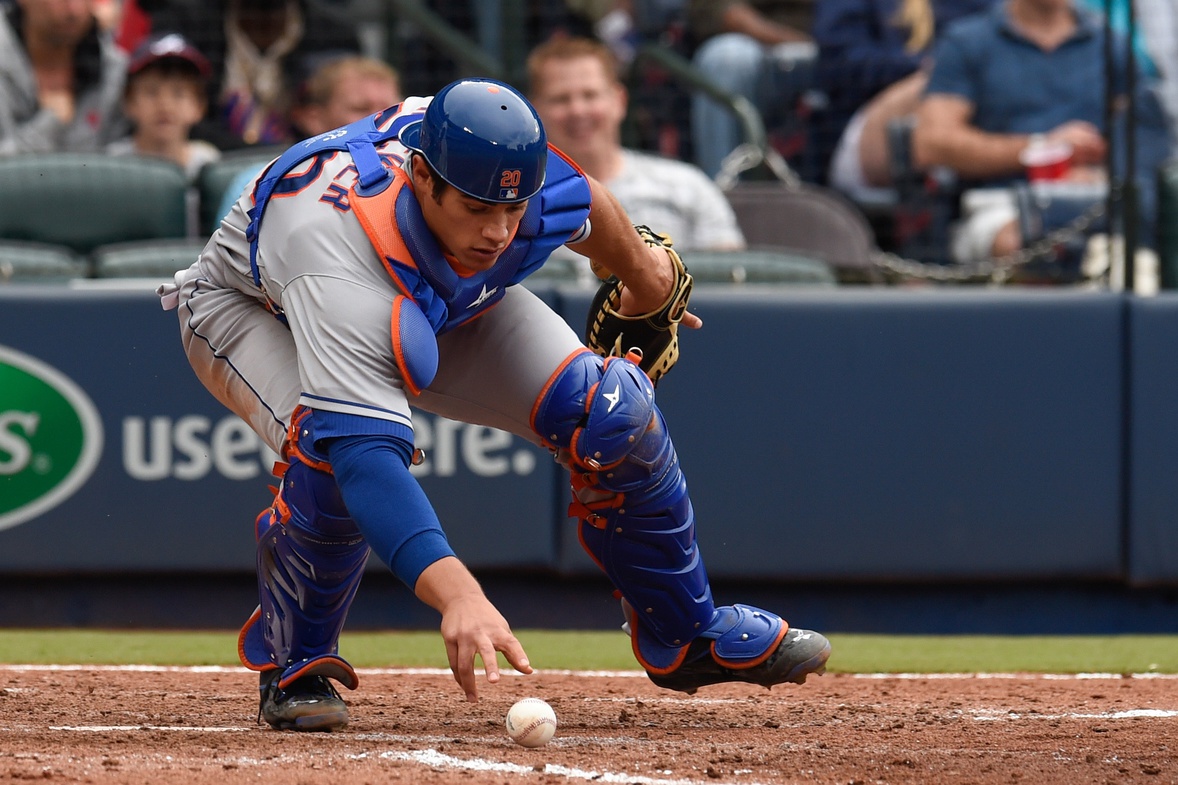
Since he was young, Anthony Recker‘s parents instilled a strong work ethic in him, repeatedly telling him that with hard work good things will transpire.
Playing multiple sports during his youth, Recker dreamed of making it professionally in baseball. While growing up in Pennsylvania, Recker fondly recalls watching his beloved Oakland A’s, having switched alliances from his hometown Philadelphia Phillies after witnessing how fans would quickly turn against their own players.
The Catasauqua-native knew he wanted to take the same field as some of his idols like Rickey Henderson, Dave Stewart, and Mark McGwire did.
While attending the University of Delaware during his freshman semester in 2001, Recker tried to walk onto the baseball team. Instead, he was cut. Not wanting to sacrifice his dream, Recker transferred out of Delaware and on advice from his mother, enrolled in a Division III school his cousin played for called Alvernia College.
Recker posted impressive stats during his four-year stint, with his lowest OPS of 1.017 coming in his junior year.
During his time at Alvernia, Recker crossed paths with a future major league teammate Zach Lutz, who recorded 37 plate appearances with the Mets in 2012-13. Lutz is the son of Alvernia’s head coach since 1987, Yogi Lutz. In what was Recker’s senior year and Lutz’s freshman season in 2005, the pair helped lead the school to a conference championship and the NCAA Mid-Atlantic Regionals.
The hard work mantra that was indoctrinated by Recker’s parents paid off when he was selected in the 18th round of the ’05 MLB Draft by his childhood favorite team, the Oakland A’s.
Fast forward to 2012, where Recker had 27 major league games under his belt with the A’s and Chicago Cubs. After he was designated for assignment by the Cubs in late October, the New York Mets claimed the then 29-year-old catcher off waivers. He made the Opening Day roster in ’13, backing up veteran catcher, John Buck.
In 151 plate appearances, Recker hit six home runs, drove in 19 runs, and posted an 89 wRC+. He even got to make an appearance out of the pen in a blowout loss against the Washington Nationals at home, tossing an inning while topping out at 88 mph.
In total, Recker spent parts of three seasons with the Mets (2013-15), posting his best caught stealing rate with the club in 2014 (37 percent), a sixteen percent increase from the prior season. Recker continued to provide power in his backup role, slugging seven home runs and driving in a career-best 27 runs in ’14.
Following his tenure with the Mets, Recker has spent time in the Cleveland, Atlanta, and Arizona organizations. He spent the ’18 season with the Diamondbacks’ Triple-A affiliate, Reno Aces, where he posted a .276/.358/.537 slash with 15 home runs and 50 RBIs.
Following the season, Recker made several appearances on SNY as an analyst, appearing on Baseball Night in New York and the Mets pregame shows. Blending his personable charm with his astute baseball acumen, Recker appears to have found a second career in broadcasting, that is, whenever his baseball career is over.
Recker hopes to latch on with a team in ’19, preparing himself in the offseason as he normally would. He included HitTrax in his routine this winter, to better refine his craft and dig deeper into the metrics.
If a job doesn’t materialize, Recker would be at peace with that decision. With a wife and two young children at home, Recker is looking forward to spending more time with his growing family. However, his aforementioned drive and work ethic simply can’t be suppressed, which is why he continues to train in hopes of reaching the majors again.
In the end, Recker holds his head up high, knowing he can tell his young children that the passion he has for his craft paid off and that their dreams can too.
I had the pleasure of speaking with Recker in mid-January where we discussed his initial reaction to getting claimed by the Mets, his approach to working with Jacob deGrom, Noah Syndergaard and Zack Wheeler, and his thoughts on pitch framing.
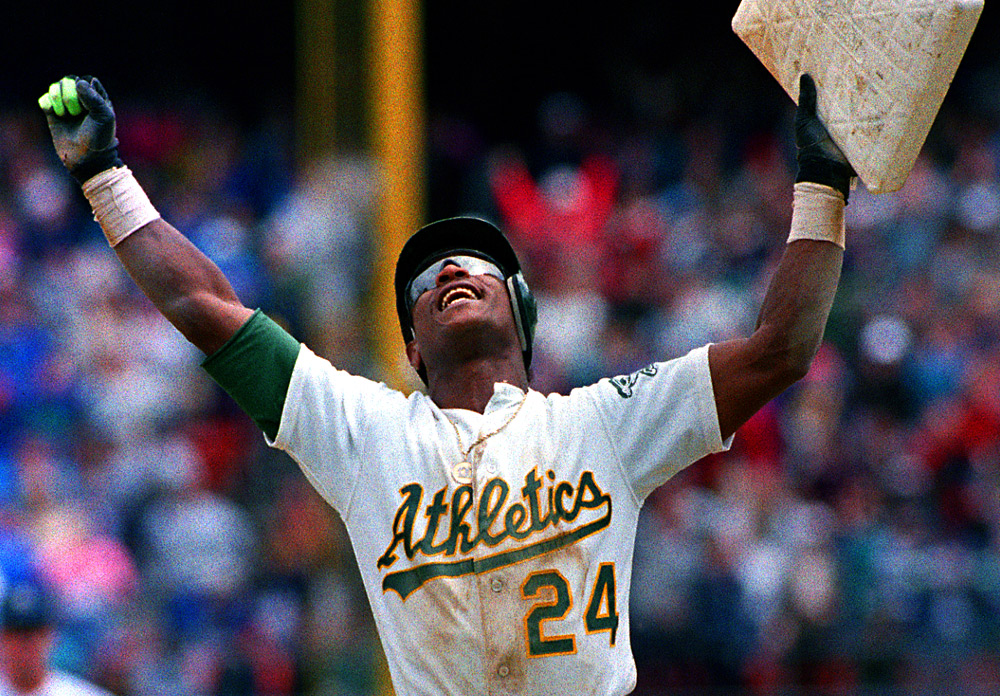
MMO: Who were some of your favorite players growing up?
Recker: Growing up in Philly, when I was really young and didn’t know any better, I was a Phillies fan because all of my friends and family were. I grew up watching Darren Daulton and that whole crew. It was a really fun time to be a Phillies fan with the World Series in ’93.
I actually ended up switching over though because I saw how all my friends and family were; they would boo them then cheer them, boo and cheer, and I just didn’t understand it. I ended up being an Oakland A’s fan, so I liked Mark McGwire, Dave Stewart, and Rickey Henderson. But I was a big McGwire fan, he was probably my idol growing up.
MMO: And who introduced you to the game at a young age?
Recker: My whole family is big sportspeople. Being young and the son of a single mother, she was the one that probably got me into it. She just got me into sports in general. Then my stepdad came around when I was eight or so, and he was huge into baseball and football, so he kind of expanded on it for me. My parents in general were really big into baseball and anything that kept me active and moving around.
MMO: At what point during your development did you start honing in on catching?
Recker: I want to say I was around ten to twelve years old. I don’t remember what happened exactly but we needed a catcher on the team and I think the kid who was catching was kind of scared of the ball. [Laughs.] My dad said, “Anthony can do it. He can catch.”
He just kind of threw me back there and I think it took me once or twice until I wasn’t scared of the ball but then I became the full-time catcher after that.
MMO: I read that you originally attended the University of Delaware where you tried to walk onto the baseball team. Unfortunately, you were cut. Can you talk about what led you to Alvernia and the experiences you had there?
Recker: Once I got cut from the team in Delaware – it was fall semester in my freshman year in 2001 – my mom literally just said on a whim, “If you want to keep playing, your cousin played at a Division III school called Alvernia College.”
I just said, ‘Okay. I had never seen it or been there, but let’s try it!’
Without even seeing the school or talking to anybody I got transferred and signed up and went and scheduled my classes. While I was there scheduling my classes I met with the coach – Yogi Lutz – and viewed the campus. But it was kind of a blind thing where I said, ‘Okay, heck with it. I’m going to do that.’
When I was transferring I did go look at Lehigh University and Lafayette College which were a lot closer to home. They were great academic schools and pretty good baseball schools, I think they produced a few baseball players in their time, but the money wasn’t right. There wasn’t a whole lot of money for them to give me in terms of scholarships. And it was far too much for my parents to afford or to put that kind of loan out on their name so I just ended up going to Alvernia.
I was able to get some grants and some other things to go there and it just worked out well.
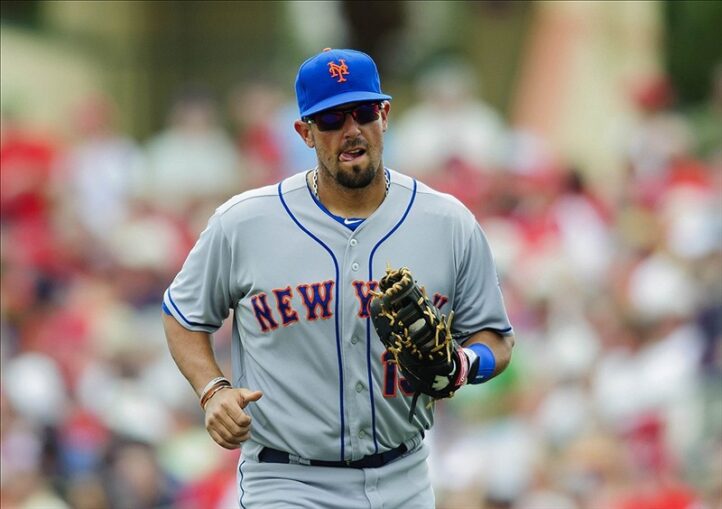
MMO: And Yogi Lutz is Zach Lutz‘ father?
Recker: That’s correct. Which is crazy the way it all worked and played out. We ended up playing together in the big leagues, too. It was really neat.
We got to play in college, my senior year was his freshman year and then obviously when I got claimed by the Mets we ended up playing together which was really cool.
MMO: What are your memories from the draft back in 2005 when you were selected by the Oakland Athletics in the 18th round?
Recker: I had no idea if I would even be drafted. I hoped I would, I thought that I would, but I had no idea. I wasn’t expecting it.
Being that I had just finished school – I hadn’t quite graduated yet – I only needed a few more courses to graduate. I talked to my parents and they said they would throw me a draft day/college graduation party the second day of the draft. We threw the party the second day because I figured if I was going to get drafted it would be the second day.
Sure enough, I went out and played a summer league baseball game, not like an affiliated or prospect league, just a beer league baseball game that I played with a lot of older guys in their thirties. I had played in that league the year before so I just went and played in that game.
As the game was ending my cell phone was in my catcher’s bag and it was just vibrating like crazy and blowing up. I went and answered the phone and I called my dad back because he called me like 10-15 times and he was excited. He said, “The A’s, the A’s drafted you!”
I didn’t even know the A’s were interested or that I was going to get drafted that day but sure enough I think I was one of the last picks on the first day of the draft, so it was pretty cool.
MMO: That must’ve been even more special for you considering you grew up rooting for the A’s?
Recker: Exactly! It’s an interesting story for someone like me from a small town on the East Coast who never even spoke to the A’s. They never said that they were interested or thought of drafting me. For them to take me it was really cool!
I didn’t even hear from them until the next day during the party that I had. I got a call from their scout who had seen me and was in the war room fighting for me to be drafted. It was pretty cool; it was an interesting way to get selected in the draft. I would say unique.
MMO: What was your initial reaction upon hearing that the Mets claimed you off of waivers from the Cubs in October 2012?
Recker: My initial reaction was, man, my buddy is either going to be really happy or really jealous! My best friend growing up – who was the best man at my wedding – is a huge Mets fan.
Funny story, back in the day, when the Mets traded for David Justice and had him for five minutes and traded him away to the A’s, he was a huge Mets fan but he was also at the time a huge David Justice fan. The Mets got him from the Yankees and for five minutes he was the happiest person in the world. Then they traded him to the A’s and I gave him so much crap for that being an A’s fan.
When I got claimed by the Mets I called my mom, and I was with my future wife and we were living at her parents’ house in California. We were about to move to Arizona to stay down there for the rest of the offseason. After the Cubs designated me we kind of put the brakes on that because wait a minute, we might not go live in Arizona because what if our spring training isn’t there?
Sure enough, I got claimed by the Mets and we were going to Florida, so we ended up staying in California. I called my parents and my buddy right away and said, ‘You’re never going to guess where I’m going to be playing!’ He was happy and jealous but happier than anything else, of course.
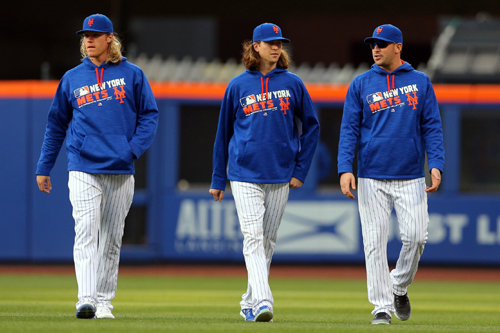
MMO: During your three years in Queens, you got to catch Jacob deGrom, Noah Syndergaard, Matt Harvey and Zack Wheeler (caught his debut). Can you talk a little about their individual approaches and how you’d go about game planning with them?
Recker: They’re all similar in the fact that they’re right-handed pitchers and all have power stuff – if you want to call it that. They can all throw 95 plus; if you’re Syndergaard you can touch 100. They all have great, powerful stuff so in that regard they’re similar. They all feature a breaking ball and a changeup.
I think the biggest thing for all of them, maybe excluding Zack, although I think he’s starting to throw his changeup a little better, was the other three liked to throw their changeups. For Harvey, that was what really set him off in 2013. For deGrom, that’s been a great pitch for him his entire career, and he continues to develop things as he goes. I noticed him doing a lot more backdoor sliders if you want to call it a slider or cutter. At 92 it’s hard to call it a slider, but it moves like a slider. They’ve all got different stuff and game planning for each was definitely different.
With Zack and Jacob, I liked to attack the top of the zone a lot more. Jacob had that little two-seam that he could use to run in or to run down and away or down and in. When he needed a ground ball he could use his changeup a little bit more often.
With Zack, he had that good power fastball up in the zone that would really take off on some guys. He still had a two-seam, too, but he wasn’t quite as consistent with it as Jake, but over the years he’s kind of worked on it through the injuries. He has more of a power curveball with good spin rate and pretty decent velocity on it, I think it would come in anywhere from 77 to 80, pretty good for a curve. And then he had a hard slider. Jake didn’t have a high spin curveball like that but he had a good slider with the fastball that he could run-up. And then he had the good changeup. The two of them were probably as similar as any of the others were.
Syndergaard was a whole different animal! Throwing strikes wasn’t his problem by the time he got to the big leagues – that was his problem in the minor leagues – but it was more about locating pitches and actually hitting quadrants. And he’s learned to do that over the years. For him, it was more managing, not necessarily balls and strikes, but just trying to manage where can we make a pitch that if we do make a little bit of a mistake we’re not going to get hurt.
Whereas the other ones – Jake especially – had really great control, Harvey had great control from the time I saw him in ’13 on. Obviously, the injuries have given him a tough time afterward. He was more of an animal and he knew what he wanted to do and had a really good game plan for himself going into the game. He thought about pitch calling a little bit differently than most people do I think. Learning that was kind of difficult at times but you talk to him and try to learn from things that he likes to do to the best of your ability and then in the game you just want to make it as smooth as possible. You don’t want to see too much shaking and delay the game because of that. I would just try to get on the same page with him as best I could and then ride it from there.
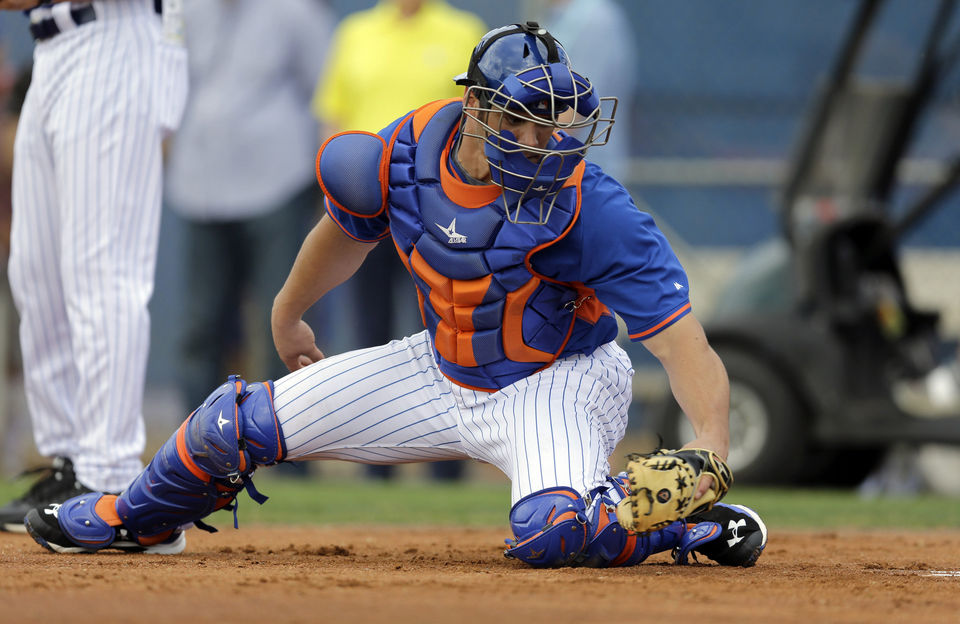
MMO: Can you break down what your schedule was like when preparing to catch on a particular day or night? How much prep work was involved with video, scouting reports, etc.?
Recker: At the time when I was there, I don’t remember if it was ’13 or ’14, but I started using that Bloomberg sports app. And I thought at the time it was a great tool; they had all the video on there and you could go back ten days or the whole year. They had the information on there in terms of percentages, averages, on what pitch and in what part of the zone and everything.
It was a really great tool and I used that a lot. When we were on the road I would do that at the hotel before I went to the field. I would be looking at stuff from each hitter that we were going to face that night potentially and obviously if our starting pitcher had faced them at all or similar batters and what they’ve been doing well lately. That was a good way for me to look at that. I was always catching their sides, too, so I got a good idea of what was working at the time for them and what might not be.
I knew what to go to in certain situations but it was really just a matter of putting in the work and then I’d get to the field and they’d have some different videos supplied for us there. I think it was the BATS program and they had the video and everything set up for us. They have all kinds of information through that too: where the guys are hitting the ball well, where they’re not, what pitches they’re hitting well and not, certain counts when they like to swing or don’t like to swing, etc.
All of that stuff went into play and I just tried to take in as much information as possible but really just be selective in what I used in a game. If I tried to take it all into the game it would be too much. I would be second-guessing myself the whole time so it was really just about finding key statistics like first pitch what can I get ahead with that they’re less likely to swing at? Or, if they’re a heavy swinger I knew I didn’t necessarily have to attack the zone right away, I could be a little bit more aggressive in getting to the edge of the plate. Maybe throwing a ball that’s strike-to-ball where it looks like a strike and comes off the plate late and I can get a swing whether it’s weak contact or a swing and a miss.
There was a lot of preparation that went into it but they made it easy. My bench coach at the time – Bob Geren – who’s now in L.A. was awesome. [Bob] Geren, Travis [d’Arnaud], and I would meet a lot to discuss our game plans. Travis and I started doing some things on our iPads. We had Pages where we basically would create little things for each team and we would just run through it real quick and we’d have a little two to three sentence take on each hitter and a generalization and then make it more game specific to the pitchers as we got along.
We all worked well and did it together and of course Dan Warthen, our pitching coach, had his own philosophies and approaches he wanted to take towards hitters. We’d be in meetings and listen to him and go from there.
MMO: For catchers, pitch framing seems to be one of the most looked at stats when evaluating defense behind the plate. How cognizant were you of your own abilities, and what are your thoughts on the metric as a whole?
Recker: In ’13, when I first got there, it wasn’t something that I knew much about. I think it was in ’14 that it was the first year that they started talking to me about that and then in ’15 it became a real thing where it was like, okay, we really want these numbers to be better. We want to get as many strikes as we can and all that.
It was new to me. My entire career it was hey, let’s keep the ball in front of you first and if we get a strike we get a strike and that’s great. The most important thing was keeping the ball in front of you, throwing guys out, and calling a good game. But yeah, pitch framing definitely became a thing.
Unfortunately, I don’t think in my career I’ve ever been considered to be at the top of that list. Travis has at times and that’s been great for him. It’s definitely become a huge tool for front offices to gauge catchers on and it’s something that if you want to catch in today’s game, you’ve really got to pay attention to it and make that your focal point of everything you do. Even offensively, nothing matters as much as pitch framing to them so that’s really got to be the number one thing and then you kind of go from there.
MMO: When you’re evaluating a catcher, what traits or skills are you specifically looking for to gauge their ability back there?
Recker: If I’m just looking at a catcher from the side, literally from the dugout, there are definitely things like their set up, the way they move, seeing kind of what they do with their eyes, where they’re at, and what they’re thinking about. You can kind of tell sometimes especially trying to focus on their game plan and calling pitches. If you’re really trying to focus on what makes a catcher a good catcher I think it’s fairly obvious to even the average fan.
You see what’s going on in New York with a guy like Gary Sanchez. There’s been gripes about him being a little bit lazy back there and not always keeping the ball in front of him. Those kinds of things are obvious and to me that’s the only thing you can say makes a guy not a good catcher is if you ever question his desire to be out there, catching the ball well, blocking the ball well. [If not] then yeah, that’s not a guy that I’d want behind the plate. Outside of that, as long as I see a guy giving it everything they’ve got and trying, and obviously once you get to a certain level you’ve got the tools so as long as you’re trying you’re going to succeed.
It takes effort and some mental toughness. You get into these counts or situations where you’re calling a breaking ball and you should be automatically assuming the ball is going to be in the dirt. I’d much rather drop down to two knees and pretend that I’m going to block the ball and then catch it in the strike zone than try to catch the ball up in the strike zone and then it bounces in the dirt and it gets by me. Things like that, just the anticipation and the mental side of the game. You want to see a guy that’s willing to put in the work to understand hitters, to understand his pitchers; there’s a lot that goes into it.
Communication is huge, that’s something that a lot of guys forget about or they got lost in thinking of what they need to do. They come off the field and they just caught an inning and maybe they gave up a run or two, but they’re up third so they’re worried about hitting but that pitcher’s coming off the field wanting to figure out what’s going on and how to fix this. You’ve got to be able to put what you’re doing aside, that offensive part of your game, and really just kind of calm him down and settle him down and get him ready to go back out there for the next inning before you take your at-bat. Otherwise, it will snowball on him and then you’ve got no shot at winning the game.
There are a lot of things that go into it and it all comes naturally eventually, you just have to learn it as you go and really just take as much in as you can as you’re going.
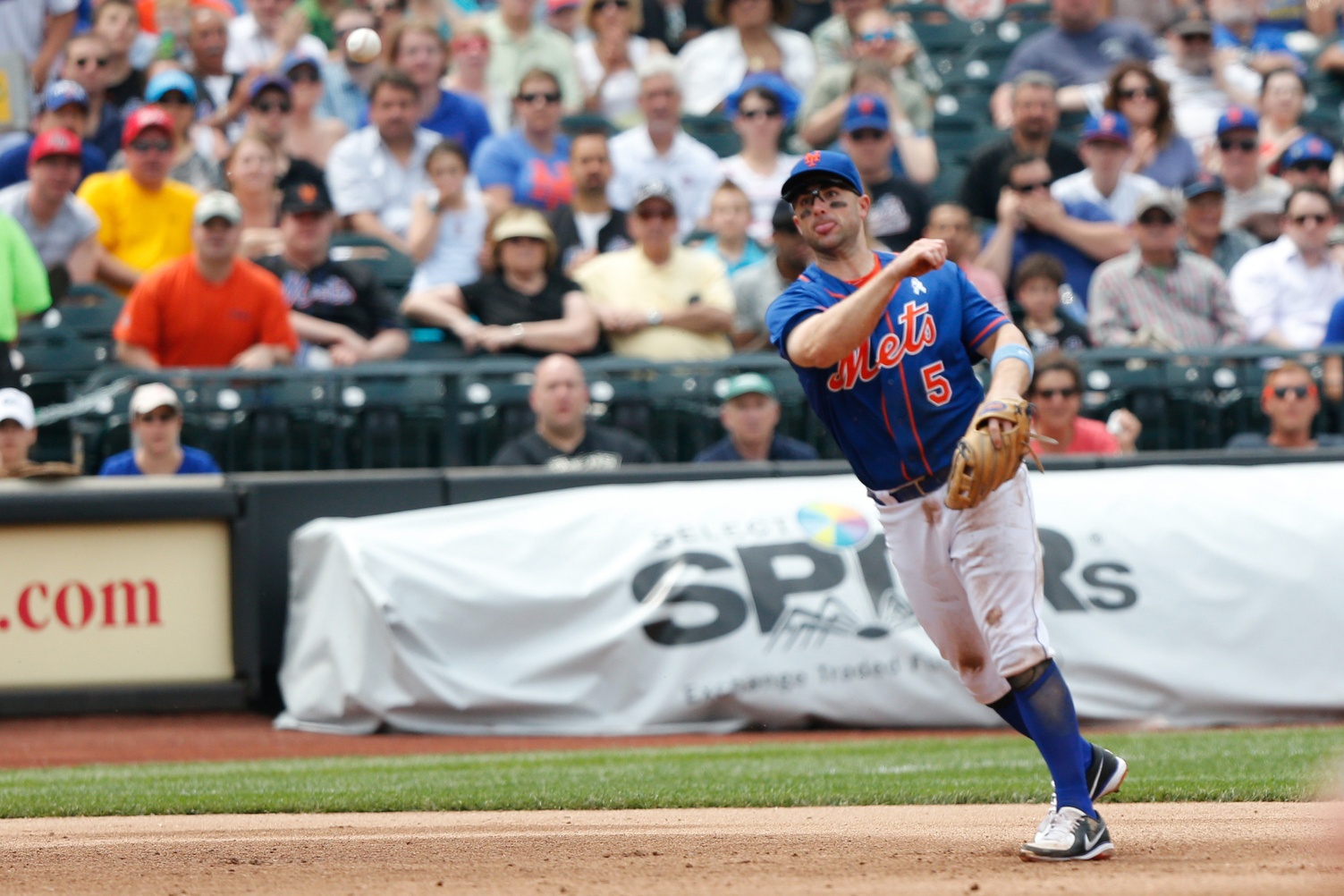
MMO: You were teammates with David Wright, who obviously played in his last game in 2018. Looking back on your tenure with the Mets, is there an anecdote you can share about Wright, or something that stands out to you most about getting the chance to play alongside him?
Recker: I mean, I don’t even know if I’m allowed to say this. [Laughs.] In 2013 when I first got there they used to do this, and I think they did this the year before, too, I don’t know how many years prior, I know they did it at least the year before in 2012. He used to have this cattle prod and it was exactly what it is, it’s a cattle prod and makes a nice little electrical shock at the end when you touch it to something … or someone. This was like the team disciplinary mechanism, and it was a fun thing. It wasn’t anything bad but we all had fun with it.
If you were late to stretch, if you were late to anything, you got prodded. And that was kind of how we kept guys in check. When someone was getting cattle prodded you had to stand in the middle of the clubhouse and everyone had to be there. They were all laughing and giving you a hard time and David would come up and give you a little shock with it.
He tried to get me once because I was out in the bullpen catching some starters for their side sessions right before the stretch and BP and all of that. He said that I was late to the position players’ stretch because I was out there catching. By the time I got in he was giving me a hard time saying he was going to prod me. At the time the other catcher was John Buck and he was a veteran and he stood up for me and said, “No, no. We’re not doing this. We’re going to put this to a vote because Anthony was out there catching.”
But that was David; he’s like the big brother type, just giving you a hard time but at the same time having fun with it. It creates that camaraderie, what a team really needs. You get that atmosphere of having fun, of having family with your teammates, and really just enjoying your time with them. That was David, that’s what he did. Being one of I don’t remember how many brothers he has, but he had several and he just had that attitude, that big brother attitude where he’d pick on you but he knew what to say when things were going bad and he knew how to keep guys and the team together.
That’s what made him the captain.
MMO: You got the chance to do some broadcast work with SNY late last season, what was that experience like for you? Is broadcasting something you could see yourself getting into in the future?
Recker: Yeah, it was awesome! I took it for what it was worth. I’m still in communication with SNY and if I want to go back I think I pretty much have an open door. They’ve been really great to me, they always told me when I was playing that I’d be great at it. To please come back when you’re done, we’d love to have you. I don’t know where it will lead but I’m definitely in talks with them and just keeping in communication with them.
It’s something I would be very interested in. I think I’d be interested in being a little closer to the game. You know, being at the stadium and doing some TV work there and broadcasting. I think that’s something that I would love to do, that I’d be good at. Being a color guy as a catcher you have a lot to say, you see things in different ways. You see what’s going on in the field from the pitcher’s standpoint, the hitter’s standpoint, you even know defensive alignments, and you know what the catcher’s thinking. At least you can put all of that stuff in your head and you can really relay it to the fans in a way that I think they can understand better.
That’s something I’m very interested in and I’m going to continue to pursue that but at the same time I’m not quite done playing yet, I think. We’ll kind of see where my career takes me. If I’m done playing then I’m done playing, and that’s okay. But I think I still have some good baseball left in me, so hopefully, you haven’t seen the last of me at Citi Field.
MMO: I know there was talk after last season of you retiring from playing. Is that something you’re still thinking about?
Recker: Yeah, it’s not necessarily retiring. I mean, let’s face it, I had a coach a long time ago, his name is Ron Plaza and I believe he was the first or third base coach for the Big Red Machine in the ‘70s, but he was a part of the Oakland A’s staff when I was there, really early in my career. And he always said, “Joe Schmo doesn’t retire, Johnny Bench retires.”
I would never call when I’m done playing retiring, I’ll call it I just didn’t get a job or I just decided to be done playing.
I think the word retiring is reserved for people who had a little bit more of an illustrious career than I did, but for now, I’m not sure if I’m done or not. I’m still working out and preparing myself to play like I have, and even more so than I have any other year. Being the type of guy that always wants to get better I try to find new ways to work out and new things to do. The cages that I’m going to now they have HitTrax, so I’m able to keep track of everything offensively, defensively; everything that I’m doing. Really just honing in on some of my skills and hoping that takes me to another level and gets me back to the big leagues.
And if a team isn’t willing to give me that opportunity then I might be done playing, and that’s okay, too. I have a wife and two kids and I’m more than happy to go get a job whether it’s broadcasting or something else and spend a little more time with them.
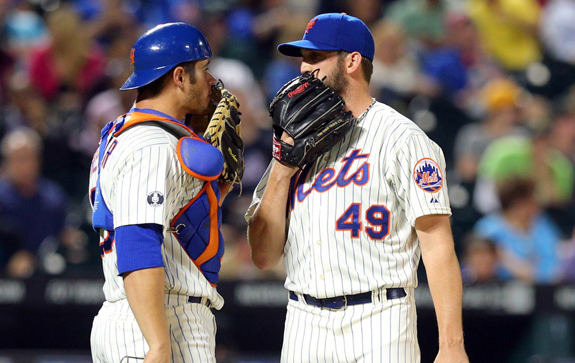
MMO: Your personality, baseball intellect, and knowledge of analytics make you a great candidate for a managerial position. Is that something you’ve ever seriously considered in the future?
Recker: Absolutely! I’m not going to close the door on anything. When the time comes and I’m definitely done playing, when I know that I’m done playing, I think that’s something that’ll be very realistic for me. I enjoy the game enough to want to manage and I think I can really relate to players. You see a lot more young managers nowadays than you did say ten years ago. Ten years ago there were a lot of 50-to-60-year-old guys managing baseball teams. Now you see guys right out of playing, I mean, in their mid-to-late thirties, similar to the age I am now, getting their first managerial shot in the big leagues, not having to go to Low-A and learn things. They really understand the game and they really understand the analytics of it, and how to take the information that’s given to them and put their players in the best places to succeed.
They understand how to relate to the players and I think that’s the biggest thing right now is just understanding that these players, they’re people. You’ve got to learn to manage them in the right way because you get lost as a player sometimes thinking about what management wants you to do, upper management I mean. The GMs and all of these numbers that they’re throwing at you and you get a little bit lost in that and you forget, and you think you’re just a number.
As a manager, I think you’ve got to make sure your players feel that they’re people still, and they’re valued. That’s the biggest thing players can feel is valued. To feel valued and like you’re a part of the team is important, you’re likely going to play well and have fun. That’s where being a manager in today’s game is really different I think. You’re much more of a people guy than just a person who’s out there telling them what to do. You’re not necessarily a boss anymore, you’re more a manager of people. I think I can bring that to any team that I would potentially manage.
MMO: When you look back on your career, what are you most proud of?
Recker: Just the fact that I was able to make it to the big leagues. Being a guy who went to a really small high school, ended up at a really small college, and had no idea I’d even get drafted. I remember when I did get drafted telling people if I made it to Double-A I’d be happy because I was extremely naive of the process. I was extremely naive of the amount of work that went into being a professional baseball player.
You learn really quickly and coming up with the Oakland Athletics was probably the best thing that could’ve happened for me. They’re an organization that does put some stock in their top few picks – which all organizations do – they give those guys every opportunity because let’s face it when they draft them they give them a lot of money so they have to. They’re already invested in them so they have to get the opportunities. But for a guy like me they don’t force their guys to specifically do things, it’s not like, hey, get out there and take this many groundballs. Get in the weight room and do this and do that. They say, this is what we think would work for you, this is what we think would help you get better, and we’re here to help you do that, but it’s really up to you. They put the onus on you to take the time to really work hard and move up through the organization.
Being a kid who came from a family that really worked hard, my parents taught me a lot of really good things. They taught me how to work hard and good things will always happen. So that was easy for me, that gave me the advantage that I needed going into an organization like that. I already had the work ethic, I had the desires, the drive, and the A’s allowed me the time to develop a little bit. I’m sure the first time they saw me swing a bat they were like, eh, I don’t know about this kid. [Laughs.] But I had some coaches there that really worked hard for me and worked with me and helped me on my way to become what I consider a fairly, roughly polished baseball player and really helped me have the opportunity to make myself into a big-league player.
There’s nothing else I can ask for, just the fact that I’ll be able to say to my kids, ‘Hey, if you work hard anything can happen. I never thought it would happen for me, so obviously it can happen for anybody.’
It’s pretty cool just to be able to say that.
MMO: I can’t thank you enough for some time today, Anthony. Thank you so much for your insight!
Recker: I really appreciate that, Mathew. Thanks so much.
Follow Anthony Recker on Twitter, @Anthony_Recker


